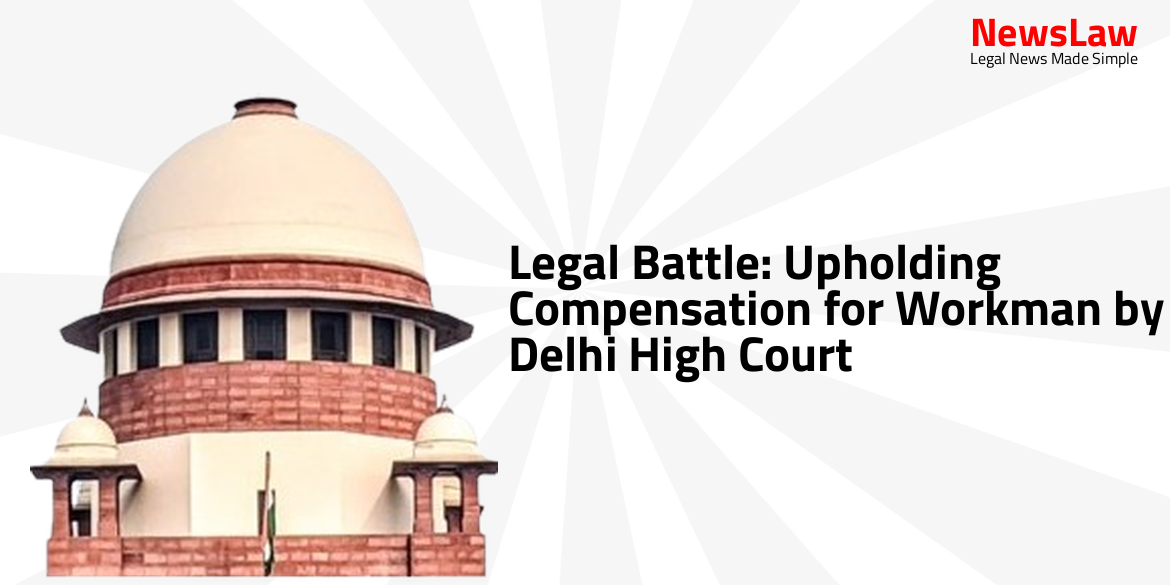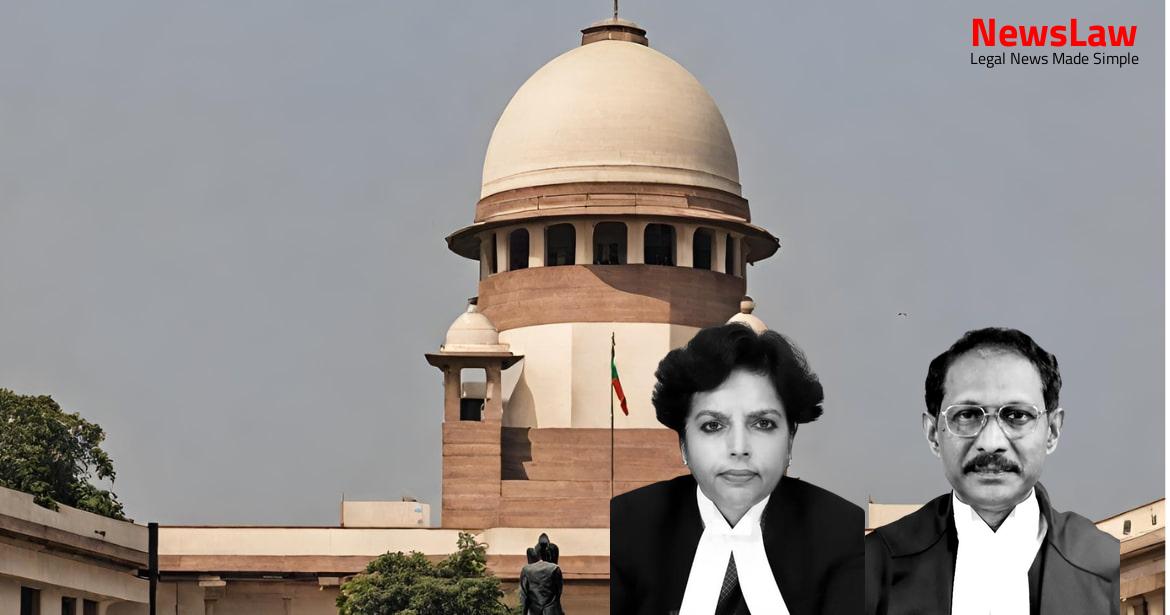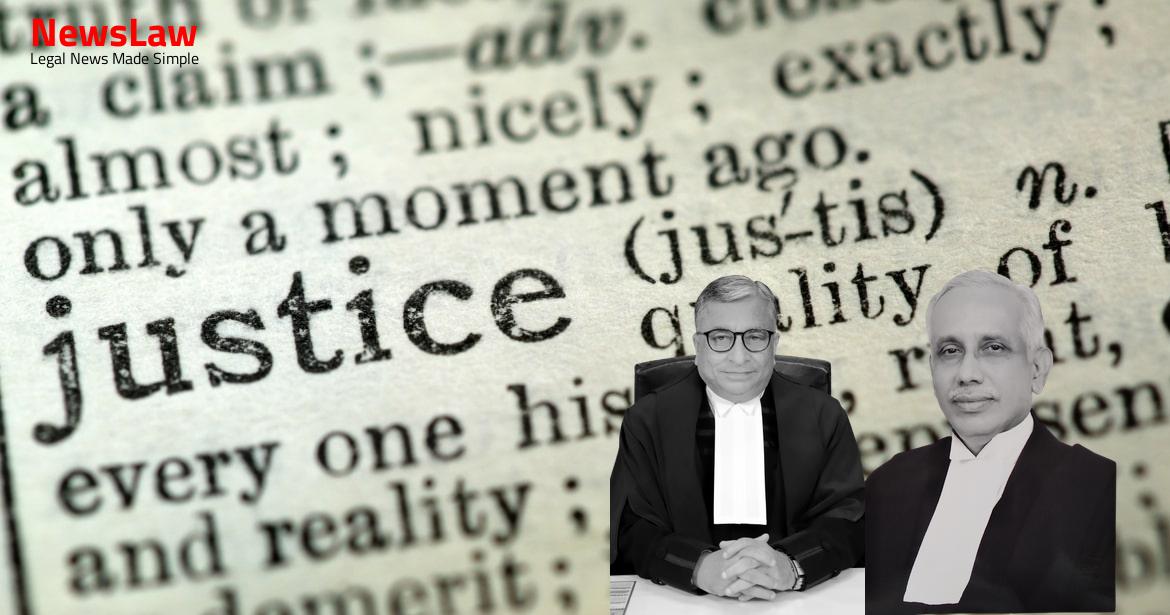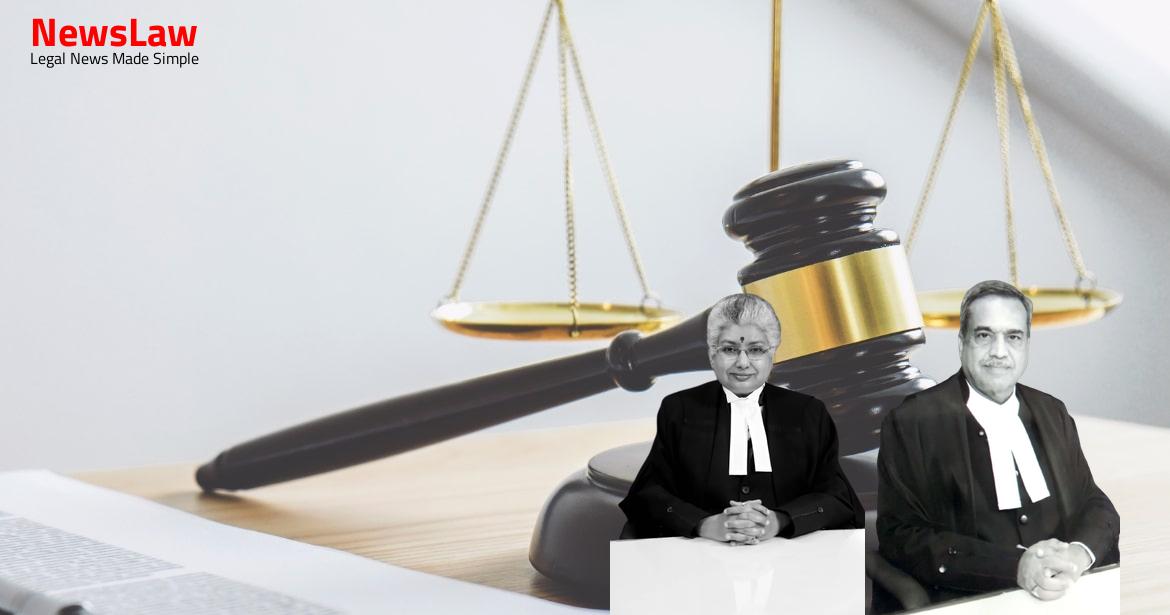In a recent legal battle, the Delhi High Court has delivered a noteworthy judgment regarding the compensation for a workman. The Court’s decision has far-reaching implications for labor rights and employer responsibilities. Let’s delve into the details of this case and understand the impact of the ruling on the involved parties and the broader legal landscape.
Facts
- The workman failed to appreciate that the workman has always been receiving the salary designated for unskilled work and never objected to it while in service.
- The judgment of the Industrial Tribunal in the designation case did not provide a ‘skilled’ designation as per the scheduled employment and specified that a ‘packer’ falls under the category of ‘unskilled’ workers
- The Ld. Labour Court was mistaken in entangling the stay in judgments unrelated to the current case, like ‘Chamundi Mopeds Ltd. vs Church of South India Association’ and ‘National Agricultural Cooperative Marketing Federation of India Ltd. vs Commissioner of Income Tax, Delhi-XI’.
- The Writ Petition was already filed, and the Union did not pursue the implementation of the impugned Award, indicating a lack of urgency in seeking a stay.
- Two workers settled with the management in the transfer case and received compensation, while the remaining twenty workers did not work from the transfer date until rejoining.
- The stay of the Industrial Tribunal’s award by the Delhi High Court on 29.11.2013 should have been considered before the implementation of the disputed award.
- The Labour Court decided in favor of the respondent workman and against the petitioner management.
- The workman was entitled to a lump-sum compensation of Rs.200,000/- to be paid within one month failing which 9% interest per annum would apply.
- Reinstatement was not an option as the management was closing down, so the workman was entitled to wages of the skilled/semi-skilled category.
- Retrenchment compensation was deemed inadequate and hence considered illegal due to the stay granted by the Delhi High Court.
- The designation case for all 22 workers was decided in favor of skilled and semi-skilled workers by POIT on 29.09.2009.
- The management incorrectly calculated retrenchment compensation using the last drawn salary instead of the skilled and semi-skilled worker wages as ordered by POIT.
Issue
- The issue before the Court is whether the stayed award of the Industrial Tribunal could be relied upon by the Labour Court to determine entitlement to compensation.
- The Workman in question was receiving unskilled labor wages from the time of appointment until the date of retrenchment.
- The Court needs to consider if the Labour Court’s decision warrants interference under Article 226 of the Constitution of India.
Arguments
- The petitioner argues that the impugned award was passed without considering all facts and circumstances.
- Despite the Industrial Tribunal’s findings on transfer orders being illegal, the petitioner took the matter to court to avoid liability under section 17B of the Act.
- The petitioner accuses the management of punishing the workman for forming a union to address grievances before labor authorities.
- It is contended that there was no clear evidence of mala fide intentions regarding the retrenchment compensation being paid inadequately.
- The petition argues that the writ jurisdiction cannot reassess evidence and material to overturn the award without showing illegality or perversity.
- The petitioner claims that the Labour Court was justified in issuing the impugned award.
- Granting designation to the claimant has been stayed due to correct calculation of retrenchment compensation and notice pay based on last drawn wages.
- Claimant’s transferred job was considered unskilled by POIT in a case filed against the transfer.
- The award regarding claimant’s job status was not challenged by the claimant, making it final and operating as res-judicata.
Analysis
- The court analyzed the issues framed for adjudication of the petition.
- The court held that the services of the workman were terminated and he was retrenched in violation of Section 25F of the Act.
- The court awarded compensation to the claimant based on the designation awarded in a prior award from 2009.
- It was observed that the management erred in not calculating notice pay and compensation as per the 2009 award, thus violating Section 25F of the Act.
- The court considered evidence presented before it and found that the management failed to prove certain claims.
- The court upheld the decision in favor of the claimant and against the management, based on the evidence and legal provisions.
- The court rejected the argument that the reliance on the 2009 award, which had been stayed, was erroneous.
- It was held that the claimant was entitled to compensation as per the skilled designation awarded, despite the stay on the 2009 award.
- The court scrutinized the findings of the Labor Court and rejected the contentions of the management regarding the award.
- The court emphasized the need to consider all facts and circumstances while making the decision, and found no error in the Labor Court’s award.
- Section 144 CPC allows for variation, reversal, setting aside, or modification of a decree, leading to restitution of parties
- Restitution aims to restore parties to their original position before an interim decision
- Successful party at the end can demand benefits earned by opposite party under interim orders
- Restitution is an obligation of the court to meet the ends of justice
- Cases like Nava Bharat Ferro Alloys Limited v. Transmission Corporation of Andhra Pradesh Limited and State of Rajasthan v. J.K. Synthetics Limited illustrate the principle of restitution
- Upon dismissal of a writ petition where stay was involved, parties should be restored to their original positions before the stay
- Financial difficulties of management do not absolve them of their obligation to pay compensation to workmen as per Section 25-FFF of the Act
- Suspension of a law allows it to remain operative in other respects, while repeal removes the law entirely
- The distinction between suspension and repeal of a law is crucial in legal proceedings
- Judicial decisions like Shree Chamundi Mopeds Ltd. v. Church of South India Trust Assn. provide clear guidelines on restoring parties after stay
- Section 25-F of the Industrial Disputes Act lays down conditions for retrenchment of a workman.
- Sub-section (a) of the provision requires the employer to give one month’s notice or pay wages in lieu of notice.
- Sub-section (b) of the provision mandates the employer to pay compensation equivalent to fifteen days average pay for every year of continuous service, during retrenchment.
- Sub-section (c) requires the employer to give notice to the appropriate government and the workman must have been in continuous service for at least one year to claim compensation.
- Continuous service is a necessary requirement for claiming compensation under Section 25-F.
- The Court finds no merit in the petitions and upholds the findings of the Labour Court.
- The petitioner management failed to present convincing arguments in their favor.
- The Labour Court’s consistent findings in similar writ petitions suggest illegal retrenchment by the management due to inadequate compensation.
Decision
- The issue before the Labour Court was the legality and justification of the workman’s retrenchment.
- The award directs the management to pay Rs.2,00,000/- to the workman within one month or face 9% interest per annum.
- Each petitioner in the batch is ordered to pay compensation to their respective workmen within three months.
- The impugned award in all connected petitions is upheld by the Court.
- The judgment is to be uploaded on the website immediately.
- Pending applications are dismissed.
Case Title: SAWHNEY RUBBER INDUSTRIES Vs. SH. VINOD PRASHAD (2024:DHC:4569)
Case Number: W.P.(C)-6064/2020



